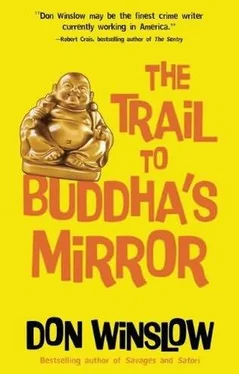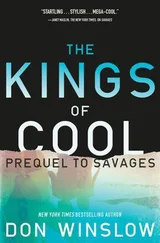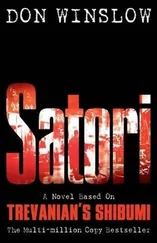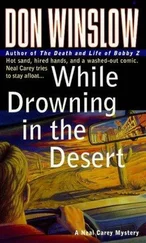Don Winslow - The Trail to Buddha_s Mirror
Здесь есть возможность читать онлайн «Don Winslow - The Trail to Buddha_s Mirror» весь текст электронной книги совершенно бесплатно (целиком полную версию без сокращений). В некоторых случаях можно слушать аудио, скачать через торрент в формате fb2 и присутствует краткое содержание. Жанр: Триллер, на английском языке. Описание произведения, (предисловие) а так же отзывы посетителей доступны на портале библиотеки ЛибКат.
- Название:The Trail to Buddha_s Mirror
- Автор:
- Жанр:
- Год:неизвестен
- ISBN:нет данных
- Рейтинг книги:3 / 5. Голосов: 1
-
Избранное:Добавить в избранное
- Отзывы:
-
Ваша оценка:
- 60
- 1
- 2
- 3
- 4
- 5
The Trail to Buddha_s Mirror: краткое содержание, описание и аннотация
Предлагаем к чтению аннотацию, описание, краткое содержание или предисловие (зависит от того, что написал сам автор книги «The Trail to Buddha_s Mirror»). Если вы не нашли необходимую информацию о книге — напишите в комментариях, мы постараемся отыскать её.
The Trail to Buddha_s Mirror — читать онлайн бесплатно полную книгу (весь текст) целиком
Ниже представлен текст книги, разбитый по страницам. Система сохранения места последней прочитанной страницы, позволяет с удобством читать онлайн бесплатно книгу «The Trail to Buddha_s Mirror», без необходимости каждый раз заново искать на чём Вы остановились. Поставьте закладку, и сможете в любой момент перейти на страницу, на которой закончили чтение.
Интервал:
Закладка:
He gave it five minutes on the bench before moving on down Columbus toward the corner of Broadway. Bypassing a half-dozen Italian cafes, bakeries, and espresso bars-there would be time for those later-he headed straight for the City Lights Bookstore.
Neal had known about the City Lights Bookstore long before he had ever visited it. What Shakespeare and Company was to the Lost Generation, City Lights was to the Beat Generation. It was a literary candle in the window that showed the way back from Kesey to Kerouac, and in a sense back to Smollett and Johnson and old Lazarillo des Tormes.
Mostly it was just a goddamn good bookstore that had tables and chairs downstairs where people were encouraged to sit down and actually read books. There were no smarmy signs about its being a business and not a library. Consequently, it was both a pleasure and a privilege to buy a book from City Lights, and that was part of what Neal had in mind.
He stepped through the narrow doorway, nodded a greeting to the clerk at the counter, and headed down the rickety wooden stairs to the basement. Several other pilgrims were browsing the shelves, rapt in their perusal of sections labeled “Counterculture,” which held treasures not easily found in Cleveland, Montgomery, or New York.
He did a little browsing himself, settled on a paperback copy of Edward Abbey’s Desert Solitaire, and sat down at a table. He spent a few minutes enjoying Abbey and then discovered an itch that required scratching on the sole of his left foot. He took off his loafer, removed the notepad and ticket stubs, and put them on the table. One of the great things about City Lights was that nobody cared what you spent your time looking at.
He started with the notepad, which didn’t take much time because there was nothing written on it, nor were there any impressions on the top or second pages. So far, no good.
The ticket stubs were more interesting, each being proof of purchase of a $3.50 round-trip fare from Blue Line Transportation on the Number four bus. Six of them, each from last week. Neal didn’t know where the Number four bus went, but it couldn’t be that far at $3.50. Where the hell could Pendleton have been commuting to? Or was it Lila? A commuting hooker?
Neal stuck the tickets and pad back in his pocket, bought the Bank the copy of Desert Solitaire, and headed back up Columbus. He knew exactly what he needed to follow up the lead, and found it at a sidewalk cafe called La Figaro, where he ordered a double iced espresso and a slice of chocolate cake. Sugar, caffeine, and carbohydrates were exactly the brain food he needed to inspire him, and he was sitting outside reveling in self-indulgence and Edward Abbey when he felt a shadow looming over his shoulder and heard a voice ask, “So, you have any more money for me?”
Neal looked up at him and smiled.
A. Brian Crowe hadn’t changed much. He still hung out in the same cafes. He was still tall and skinny, still sported shoulder-length blond hair, and still dressed all in black. Even carried the same black satin cape draped over his shoulder.
“Are there more corporate giants wanting to film their obscenities in front of my art?” Crowe asked.
“I’m afraid not.”
“Then you could at least offer me an espresso.”
“It’s the least I could do.”
Crowe signaled the waitress, who headed straight for the espresso machine. Crowe was obviously no stranger to cadging drinks at La Figaro.
“How’s the life of a starving artist?” Neal asked when the coffee had been served.
“Fat,” Crowe answered. He swirled half the espresso around in his mouth, then jerked his head back suddenly and swallowed. He savored the aftertaste, then jerked his thumb back over his shoulder at a skyscraper down in the Financial District. “They wanted a sculpture for their lobby. They commissioned Crowe, who charged them an unconscionable fee, which they foolishly paid. Crowe bought his apartment.”
“You bought an apartment?”
“It was a very large sculpture,” he explained. He tilted the cup into his mouth again and knocked the coffee back. His prominent Adam’s apple bobbed, and he looked like a turkey swallowing raindrops. “It occupies a prominent place in a traffic pattern trod by the sensually enslaved but socially ambitious, some of whom have decided to attempt their climb up the social ladder clutching their very own Crowe. The monetary expression of their undying gratitude allows Crowe to live in the manner to which he has become accustomed.”
“Sun room? View of the bay?”
“In short, I am in, and therefore in the money. Buy me another espresso.” His long fingers whipped a card from his pocket.
“C’mon, Crowe! Business cards?”
“You know a lot of corporate types, don’t you?”
“I guess the Sixties are really over.”
Crowe raised an eyebrow at the waitress, who quickly came over with two espressos. Crowe leaned over his cup and looked sadly at Neal. He dropped the artsy pose and said, “My three-piece-suit clients are always asking me to get them acid. Acid! I haven’t done acid since the first Monterey Festival.”
“So you’re off the bus?”
“And on the gravy train. The Sixties are over, the Seventies are on the downslide, and the Eighties are almost upon us. You want to be carrying some money into the Eighties. Remember that, young Neal. It’s about making money now.”
Neal took the card. “My clients don’t usually come to me looking for art, but…”
“Networking, you know? Networking gets the right people together with the right people.”
“The ‘right people,’ Crowe? You joining the country club next? You were a communist, for crying out loud!”
“I turned in my card. I’m thirty-eight years old, young Neal. I can’t work for rice and beans and dope anymore. One day I looked in the mirror and saw my happy hippie face differently. It looked pathetic. I was a tourist attraction, local color for the tourists who hadn’t figured out the hippie thing was already dead.
“So I quit doing art for art’s sake and started doing it for A. Brian Crowe’s sake. I learned some interesting things, like the fact that a corporation won’t even look at a piece that costs a thousand bucks, but will fight over the same piece when it costs ten thousand bucks. I just started adding zeros to my price tags. I got myself an agent and started going to parties and sipping white wine with the right people. You can call it selling out… I call it selling.”
Neal avoided his gaze. Crowe looked older. The fire in his eyes had become embers.
“It’s okay with me, Crowe.”
The artist snapped back into his role. He stood up, whirled his cape around his shoulders, and said, “Crowe’s address and phone number are on the card. Give Crowe a call. We’ll do dinner.”
Neal watched him stride out the door. A. Brian Crowe, flamboyant artist, counterculture hero, Gold Card member.
That’s all right, Neal thought. Every one of us is at least two people.
3
Neal got back to the Hopkins, found Blue Line Transportation in the Yellow Pages, dialed the number, and found out that the old Number four plied a route from downtown San Francisco to Mill Valley, where it dropped its passengers at “the Terminal Bookstore.” Neal wondered if the Terminal Bookstore specialized in texts for morticians, but was generally willing to ride any bus that ended its journey at a bookstore. He had an hour and a half to catch the two-twenty from Montgomery Street in the Financial District.
He went down to the gift shop in the hotel basement and picked up a guidebook to the Bay Area. The index told him that he could read about Mill Valley on page sixty-four, where he learned that Mill Valley was a charming little village in Marin County, nestled on the southern base of Mount Tamalpais, just a few minutes’ drive from the Golden Gate Bridge.
Читать дальшеИнтервал:
Закладка:
Похожие книги на «The Trail to Buddha_s Mirror»
Представляем Вашему вниманию похожие книги на «The Trail to Buddha_s Mirror» списком для выбора. Мы отобрали схожую по названию и смыслу литературу в надежде предоставить читателям больше вариантов отыскать новые, интересные, ещё непрочитанные произведения.
Обсуждение, отзывы о книге «The Trail to Buddha_s Mirror» и просто собственные мнения читателей. Оставьте ваши комментарии, напишите, что Вы думаете о произведении, его смысле или главных героях. Укажите что конкретно понравилось, а что нет, и почему Вы так считаете.












